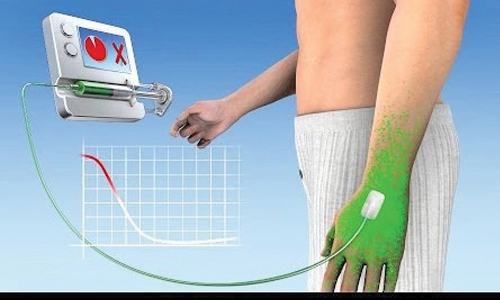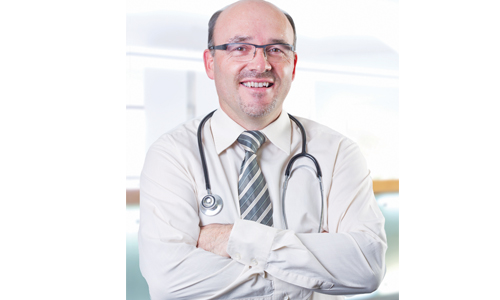Patient controlled Analgesia
Amongst the worries of patients prospectively undergoing surgery, finding themselves in a pain condition is on top of the list. Apart from the wish to avoid pure discomfort it is also the loss of control within the situation itself which is often projected as a negative perception to the things that might come up in the future and affect the patient’s destiny.
There is good medical evidence that a pain condition itself has negative impact on the overall result of the recovery process after surgical intervention. Even not yet fully explained data showing elevated levels of hormones and messenger substances as cortisol and norepinephrine metabolites associated to status of pain lead to the assumption that pain condition delays wound healing. It aggravates or reveals possible diagnosis on the side as arterial hypertension and diabetes mellitus. Therefore pain condition has to be treated as a isolated pathological entity or simply as a individual disease itself and has not to be ignored as an inevitable consequence following surgery that needs to be relieved only as an act of humanity.
To encounter pain condition as foreseen after surgical interventions modern medicine offers various strategies of pain management concepts.
One of the most advanced methods which puts the patient himself back into control is the patient controlled pain therapy (analgesia) PCA which implicates the self delivered administration of a strong opioids i.e. morphine in defined doses preferentially via intravenous access to the patient himself.
This principle follows the individual needs of the patient and is not limited to a scheduled timing.
Conventional pain management concepts in hospitals are limited to time schedule based administration of standard analgetics. Additional demands of analgesics are only recognized if the patient actively notifies the hospital staff which is followed by a time of waiting in pain and frustration.
The PCA concept is strongly bound to a device called PCA pump. It is a lightweight portable device. Actually it is a modified infusion pump which is loaded with the analgesic medication i.e. morphine that reaches the patient via an established intravenous access line.
The medication is preferably administered by pressing a button on the device this can be executed by the patient or by assisted hospital staff.
For safety reasons and to prevent overdose or abusive use the device is code locked and programmed by a specialist for bolus dose, overall dose and time limit for demand (locktime).
What are the advantages of patient controlled pain therapy (analgesia) PCA:
It puts patients back into control to participate actively on the proceedings within their recovery from surgical procedures.
Immediate action of the analgesic drug self administered prevents the patient from waiting and suffering in pain
Uncomfortable and painful procedures within the hospital stay like physiotherapy, change of dressing, removal of drains and others can be covered on the spot
Method is not limited for surgery but can also be applied for other acute or chronic pain conditions i.e. in sickle cell crisis.
Data shows that the overall dose of analgesic medication and therefore possible side effects as dizziness, respiratory dysfunction, addiction and Nausea are less likely.
PCA does not violate conventional analgesic protocols i.e. baseline therapy with nonsteroidal and steroidal analgetics. In contrast it supports them.
What are the limits of patient controlled pain therapy (analgesia) PCA:
In patients with mental disorders or learning deficits as well as in handicapped persons who are not able to execute the bolus application by pressing the button PCA might not suitable without assistance.
Very young patients (children under 5 years) are excluded.
Two devices for patient controlled pain therapy are operational 24/7 in german orthopedic hospital.
Check out our Instagram account @germanorthobahrain for more helpful information.
Dr. Heiner Abel
Senior Consultant Anaesthesiologist
German Orthopaedic Hospital
Related Posts


